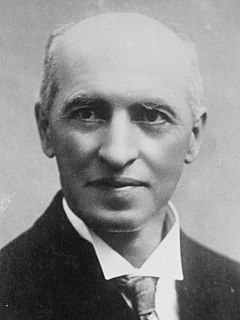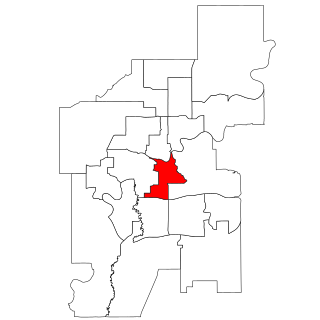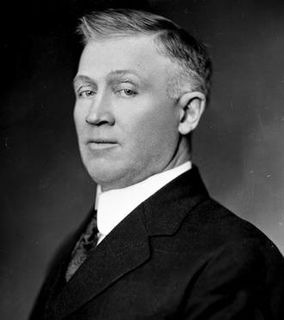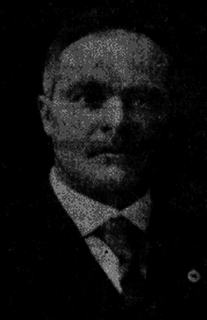Related Research Articles

Alexander Cameron Rutherford was a Canadian lawyer and politician who served as the first premier of Alberta from 1905 to 1910. Born in Ormond, Canada West, he studied and practised law in Ottawa before he moved with his family to the North-West Territories in 1895. There, he began his political career, winning in his third attempt a seat in the North-West Legislative Assembly. In keeping with the territorial custom, Rutherford ran as an independent but generally supported the territorial administration of Premier Frederick W. A. G. Haultain. At the federal level, however, Rutherford was a Liberal.
The Progressive Party of Canada was a federal-level political party in Canada in the 1920s until 1930. It was linked with the provincial United Farmers parties in several provinces, and it spawned the Progressive Party of Saskatchewan, and the Progressive Party of Manitoba, which formed the government of that province. The Progressive Party was part of the farmers' political movement that included federal and provincial Progressive and United Farmers' parties.

The 1988 Canadian federal election was held November 21, 1988, to elect members of the House of Commons of Canada of the 34th Parliament of Canada. It was an election largely fought on a single issue: the Canada–United States Free Trade Agreement (FTA).
There have been various groups in Canada that have nominated candidates under the label Labour Party or Independent Labour Party or other variations from the 1870s until the 1960s. These were usually local or provincial groups using the Labour Party or Independent Labour Party name, backed by local labour councils or individual trade unions. There was an attempt to create a national Canadian Labour Party in the late 1910s and in the 1920s, but these were partly successful. The Communist Party of Canada, formed in 1921/22, fulfilled some of labour's political yearnings from coast to coast, and then the Co-operative Commonwealth Federation – Worker Farmer Socialist" was formed in 1932. With organic ties to the organized labour movement, this was a labour party by definition.

The United Farmers of Alberta (UFA) is an association of Alberta farmers that has served different roles in its 100-year history – as a lobby group, a successful political party, and as a farm-supply retail chain. As a political party, it formed the government of Alberta from 1921 to 1935.

The 1945 Canadian federal election was the 20th general election in Canadian history. It was held June 11, 1945 to elect members of the House of Commons of Canada of the 20th Parliament of Canada. Prime Minister William Lyon Mackenzie King's Liberal government was re-elected to its third consecutive government, although this time with a minority government as the Liberals fell five seats short of a majority.

The 1913 Alberta general election was the third general election for the Province of Alberta, Canada. The writ was dropped on 25 March 1913 and election day was held 17 April 1913 to elect members of the Legislative Assembly of Alberta. Elections in two northern districts took place on 30 July 1913 to compensate for the remote location of the riding. The method to elect members was under the First Past the Post voting system with the exception of the Edmonton district which returned two members under a plurality block vote. The writ period for the general election was very short being 23 days.

The 1921 Alberta general election was the fifth general election for the Province of Alberta, Canada. It was held on July 18, 1921, to elect members to the 5th Alberta Legislative Assembly. It was one of only five times that Alberta has changed governments.

Calgary was a provincial electoral district in Alberta, Canada, mandated to return one to six members to the Legislative Assembly of Alberta from 1905 to 1913, and again from 1921 to 1959. The district largely encompassed the boundaries of the City of Calgary, and was revised accordingly as the city grew.
The Communist Party of Alberta is a provincial political party in Alberta, Canada. It is a provincial branch of the Communist Party of Canada.
The Edmonton provincial electoral district also known as Edmonton City from 1905 to 1909, was a provincial electoral district in Alberta, Canada mandated to return members to the Legislative Assembly of Alberta from 1905 to 1917 and again from 1921 to 1959.

Edmonton-Strathcona is a provincial electoral district for the Legislative Assembly of Alberta, Canada. It shares the same name as the federal electoral district of Edmonton Strathcona.

Joseph Andrew Clarke was a Canadian politician and lawyer. He served twice as mayor of Edmonton, Alberta, was a candidate for election to the House of Commons of Canada and the Legislative Assembly of Alberta, and was a member of the Yukon Territorial Council.

Charles Macnamara "Charlie" O'Brien was a Canadian socialist activist and politician in Alberta, Canada. He served in the Legislative Assembly of Alberta from 1909 to 1913.
Robert Eldon Campbell was a provincial politician from Alberta, Canada. He served as a member of the Legislative Assembly of Alberta from 1917 to 1921 sitting with the Conservative caucus in opposition.
The Progressive Party of Saskatchewan was a provincial section of the Progressive Party of Canada and was active from the 1920s to the mid-1930s. The Progressives were an agrarian, social democratic political movement. It was originally dedicated to political and economic reform; it also challenged economic policies that favoured the financial and industrial interests in Central Canada over agrarian interests. Like its federal counterpart it favoured free trade over protectionism.
Rice Sheppard was a politician and farmers' activist in Alberta, Canada. He served on Edmonton City Council for many years, ran for mayoral, provincial, and federal office, and was an executive member of the United Farmers of Alberta.
Olds was a provincial electoral district in Alberta, Canada, mandated to return a single member to the Legislative Assembly of Alberta from 1909 to 1963.
The Dominion Labor Party (Alberta) was a minor political party. It was founded on June 11, 1918 when Edmonton's Labour Representation League renamed itself the Alberta wing of the DLP. Its executive included Mr. Marshall, Mr. Mercer, Mr. Dan Knott, later mayor of the city, White, Findlay and Farmilo, and Elmer Roper, later mayor Edmonton.